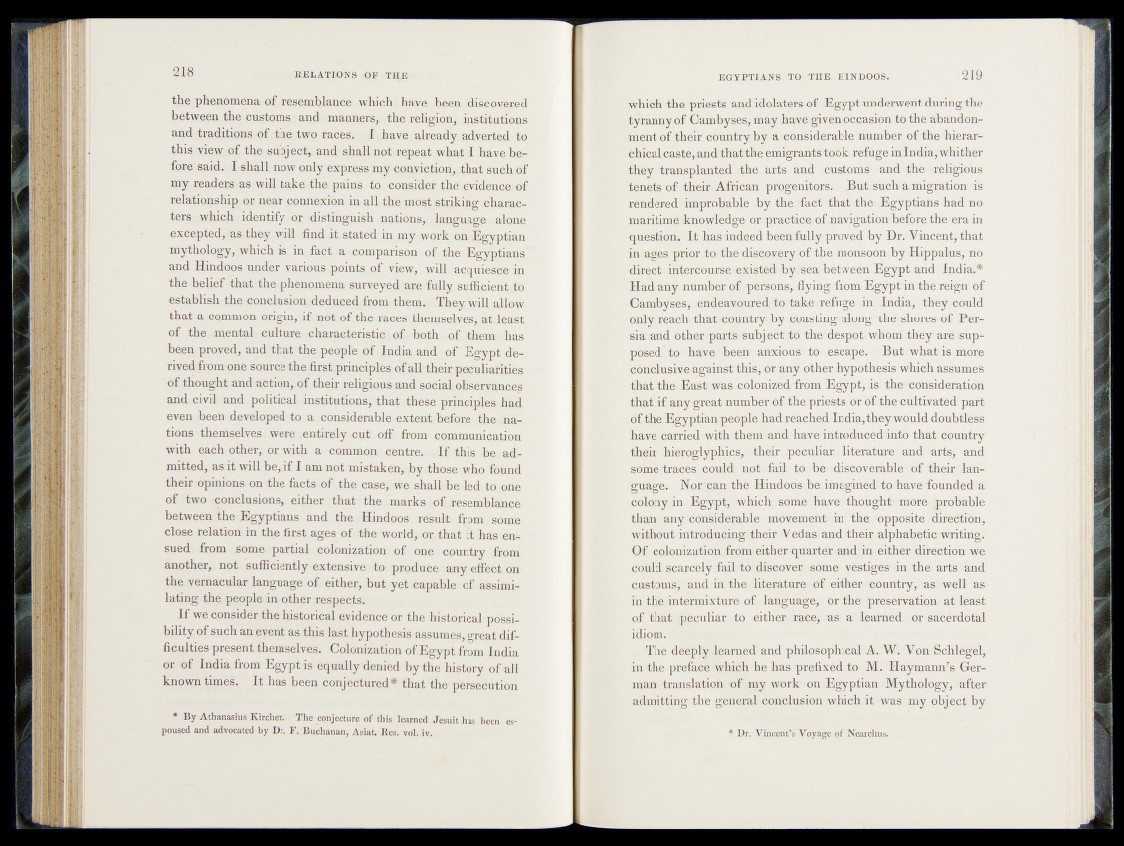
the phenomena of resemblance which have been discovered
between the customs and manners, the religion, institutions
and traditions of the two races*; 1 have already adverted to
this view of the subject, and shall not repeat what I have before
said. I shall now only express my conviction, that such of
my readers as will take the pains to consider the evidence of
relationship or near connexion in all the most striking characters
which identify or distinguish nations, language alone
excepted, as they will find it stated in my work on Egyptian
mythology, which is in fact a comparison of the Egyptians'
and Hindoos under - various points of view, will acquiesce in
the belief that the phenomena surveyed are fully sufficient, to
establish the conclusion deduced from them. They will allow
that a common origin, if not of the races themselves, at least
of the mental culture characteristic of both of them has
been proved, and that the people of India and of . Egypt de-,
rived from one source the first principles of all their peculiarities
of thought and action, of their religious and social observances
and civil and political institutions, that these principles had
even been developed to a considerable extent before the nations
themselves were entirely cut off from communication
with each other, or with a common centre. If this be admitted,
as it will be, if I am not mistaken, by those who found
their opinions on the facts of the case, we shall belled to .one
of two conclusions, either that the marks of resemblance
between the Egyptians and the Hindoos result from some
close relation in the first ages of the world, or that i l has ensued
from some partial colonization of one country from
another, not sufficiently extensive to produce any effect on
the vernacular language of either, but yet capable of-assimilating
the people in other respects.
If we consider the historical evidence or the historical possibility
of such an event as this last hypothesis assumes, great difficulties
present themselves. Colonization of Egypt from India
or of India from Egypt is equally denied by the history of all
known times. It has been conjectured* that the persecution
* By Athanasius Kircher. The conjecture of this learned Jesuit has been espoused
and advocated by Dr. F. Buchanan, Asiat. Res. vol. iv.
which the priests and idolaters of Egypt underwent during the
tyranny of Cambyses, may have given occasion to the abandonment
of their country by’a'considerable number of the hierarchical
caste, and that th'e emigrants took refuge in India, whither
they transplanted the arts and vcustoms and the »religious
tenets of their African progenitors. But sueh a migration' is
rendered improbable by the fact thabthe?vEgyptians had no
maritime knowledge or practice, of .navigation-before the' era in
question. It has indeed been fully proved by Dr. Viricbnt,that
in ages prior to the discfoveryof- the. monsoon by HippaMts, h<S
■direct intercourse-existed by-sea.-between Egypt-and India,*
Had any number of persons, flying from Egypt in theasergn’iof
Cambyses, endeavoured-to take reffngj^ran jlndia, * they-could
only reach that country-by coasting afejitg the shores of Perr
sia and other parts subj ect to the despot whom- they are Supposed
to have been anxious tobeseape. -.-But what-is more
Gonclusiveagajhst this, or any other hypothesis which assumes
that the Bast wHs Gdlbnized; from Egypt, us. the considemtibh
that if any great number of the priests, or bf therpdltivated part
of the Egyptian people had reached India,they would doubtless
have carried with them and have introduced into that country
their hieroglyphics, their peculiar, literature and artsy and
some-traces, could not fail to be > discoverable hof -their Jan*
Huane. Nojncan the Hindoos be imaignliiitefG he^feiEad^ph
colony in Egypt, which some have thought more probable
than any considerable movement, in the opposite direction^
without introducing their Vedas and their alphabetic writing*
Of colonization from either quarter and in either direction we
could, scarcely fail to discover some vestigfes^in the arts and
customs, and in the literature of either country, as- well ab
in the intermixture of language, or the preservation at-least
of that peculiar to either race, as* a learned or sacerdotal
idiom.
The deeply learned and ptaibsSpMeal 'A; W* Von- Schlegbl,
in the preface which he has prefixed to M. Haymann’s German
translation of my work on Egyptian Mythology* after
admitting the general conclusion which it was my object by
* Dr. Vincent’s Voyage of Nearchus.